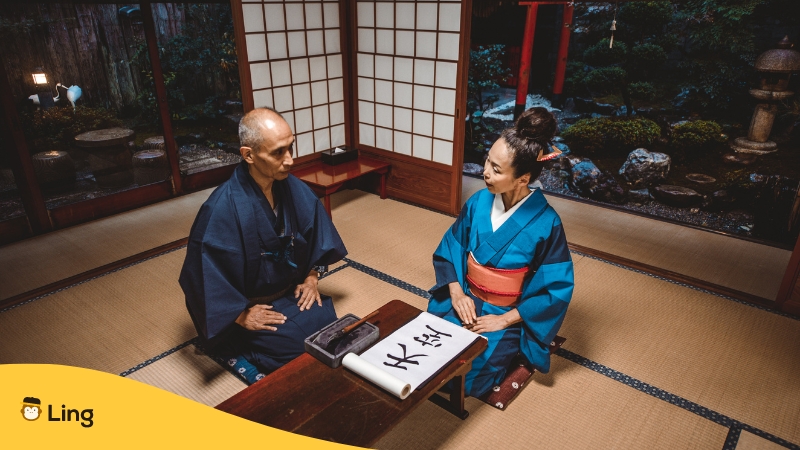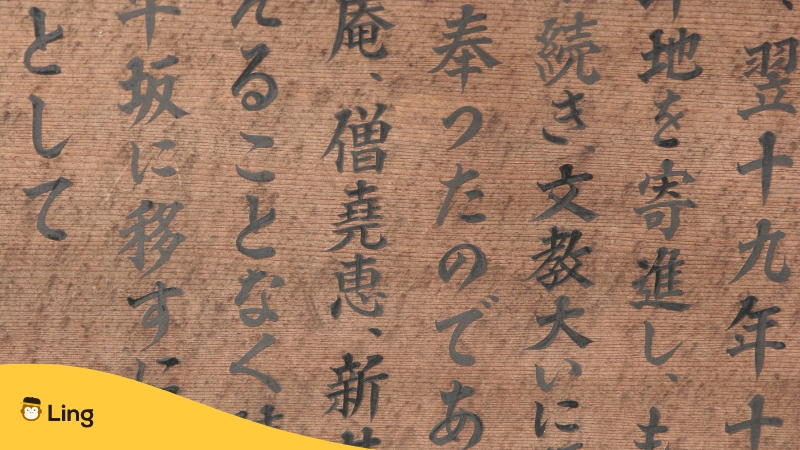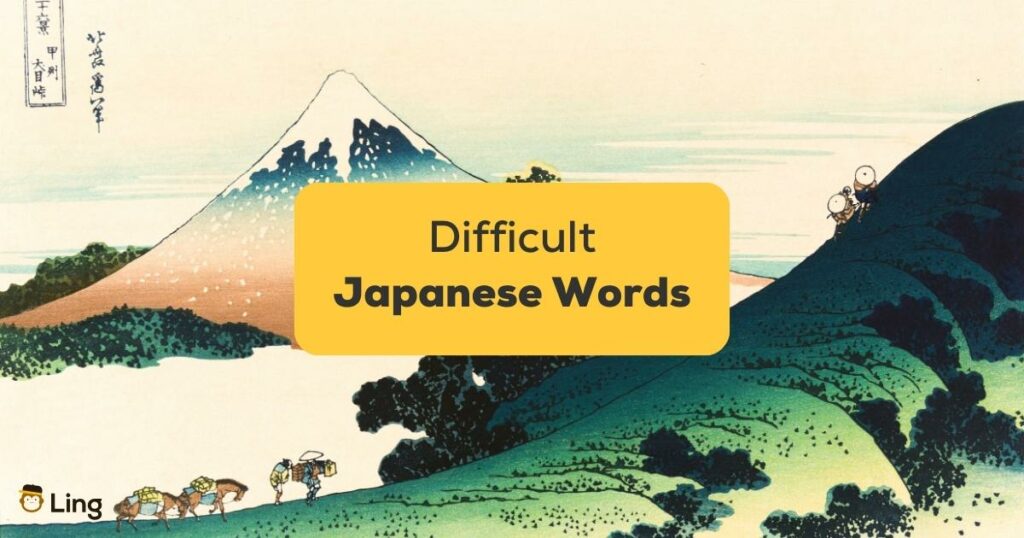Looking to embark on the epic journey of mastering difficult Japanese words? That’s a brilliant idea!
Out of all the languages in the world, Japanese seems to be one of the most learned ones. One of the reasons behind this is due to its unique difference among the other Asian languages. For instance, it has a fairly cool script that’ll make you feel like you’re a main character in an anime. Additionally, this language alone can help you professionally and give you more chances to work in different industries and roles.
If you are learning this, then I bet you’ve also come across some pretty difficult Japanese words. Want to get to know some more? Read here!
What Are The Difficult Japanese Words To Write?
There’s a wild world of unique words in Japanese! For example, to conquer the mighty JLPT N2 level, you’ll have to tap into the power of approximately 6,000 words. That’s right, 6,000 linguistic warriors are ready to join your vocabulary army. And let me tell you, even one word can be tricky to learn. It’s like an unpredictable puzzle that requires your utmost dedication and practice to master.
Yeah, one of the reasons why Japanese words can be challenging to write is because there are so many kanji characters to learn and remember.
| English | Hiragana | Katakana | Kanji | Pronunciation |
|---|---|---|---|---|
| University | だいがく | ダイガク | 大学 | Daigaku |
You see, not only does it have three writing systems, but it also has a sneaky little trick up its sleeve called “kanji.” It’s like the cool older sibling of the Japanese writing family, adding a dash of complexity and elegance to the mix.
Guess what? Even Japanese people find Kanji difficult too. Many people can read the word, but if you ask them to hold a pen and write it down, they’ll probably give up too.
So, don’t worry. With plenty of practice, you can master them quickly. Should we start looking at those difficult Japanese words to write?
| English | Japanese | Romaji |
|---|---|---|
| Depression | 鬱 | Utsu |
| Luxurious | 贅沢 | Zeitaku |
| Rose | 薔薇 | Baara |
| Lemon | 檸檬 | Remon |
| Olive | 橄欖 | Kanran |
Writing those words can be challenging because people don’t really use them in everyday conversations, so they rarely write them down.
Let’s not forget those super challenging kanji characters that can have up to 84 strokes. So basically, there are some words in Japanese where they repeat one kanji character 3 to 4 times to create a word. For example, the word “ぎょう (gyou)” means “fish thriving,” and it repeats the kanji character 魚 (sakana) four times, making it a word with 44 strokes.

What Are The Difficult Japanese Words To Pronounce?
You may encounter a Japanese word smooth as butter on your tongue, effortlessly rolling off your vocal cords. You think, “Hey, this will be a piece of cake to write!” But hold your horses, learners, because just when you thought you had it all figured out BAM! The writing hits you like a ninja throwing star.
Dear English speakers! Even though Japanese isn’t a tonal language like others, the art of Japanese pronunciation may be quite challenging!
Fear not; I shall greatly delightfully guide you through this linguistic maze!
| English | Japanese | Romaji |
|---|---|---|
| Couldn’t tell | 伝えられなかった | Tsutaeranakatta |
| (It) was not warm | 温かくなかった | Atatakakunakatta |
| Low-income group | 低所得者層 | Teishotokushasou |
| Men and women of all ages | 老若男女 | Rounyakunanyo |
| To appear | 現れる | Arawareru |
| Output power | 出力 | Shutsuryoku |
| Clumsy | おっちょこちょい | Occhokochoi |
| Laparoscopic surgery | 腹腔鏡手術 | Hukukuukyoushujyutsu |
| 6-Nation Talk Conference | 六カ国協議 | Rokkakokukyougi |
| In the middle of a surgical operation | 手術中 | Shujutsuchuu |

Is The Japanese Language Difficult To Learn?
Many native English speakers rank Japanese among the most challenging languages to master. It’s not easy to learn, what with the three different writing systems, the opposite sentence structure from English, and the complicated politeness hierarchy.
Also, Japanese can be just as challenging as other languages. It’s like when non-English speakers have to learn verb conjugation and tense forms while studying an English word. And yes! Japanese also has those rules.
Let me show you the inflections of the Japanese term 食べる, which means “eat.”
| Affirmative | Negative | |
|---|---|---|
| Non-past (casual) | 食べます | 食べない |
| Non-past (casual) | 食べます | 食べません |
| Past tense (casual) | 食べた | 食べなかった |
| Past tense (polite) | 食べました | 食べませんでした |
| Te-form | 食べて | 食べなくて |
| Potential | 食べられる | 食べられない |
| Passive | 食べられる | 食べられない |
| Causative | 食べさせる | 食べさせない |
| Causative passive | 食べさせられる | 食べさせられない |
Just when you thought you had conquered the Japanese language, along comes grammar to keep you on your toes. But fear not, for with great challenges come even greater rewards.
In Summary
Alright, that is the difficult landscape of Japanese pronunciation and the complicated art of writing those difficult characters. It’s a rollercoaster of linguistic challenges that’ll leave you both amazed and slightly perplexed. But hey, don’t sweat it! With practice, you’ll be able to remember all of these like a boss!
Are you excited to learn more Japanese words so you can have better conversations with Japanese people? Hey, let’s get started learning Japanese with Ling!
Learn Japanese With Ling Now!
Get ready to level up your Japanese skills with the incredible Ling! This language-learning wizard will take you on an epic journey through the world of Japanese, where you’ll conquer new words, master tricky grammar, and unlock the secrets of fluent conversation. We have a treasure trove of vocabulary waiting for you, covering 50+ topics. That’s right, we’ve got everything you need to conquer those daily chit-chats in Japanese.
Are you feeling a bit hesitant when it comes to chatting with native speakers? Well, fear not because we’ve got just the thing for you! Introducing our super-duper smart chatbot that’s here to save the day. This nifty little bot will help you practice your conversational skills right from the comfort of your own home. It’s like having a mock conversation buddy at your fingertips! So, let’s give it a whirl and boost your confidence in no time!
Most Japanese learners chose the Ling app for their language journey, so why not join them? Download Ling from App Store or Google Play Store today, and choose subscription options to access the entire course!



































































